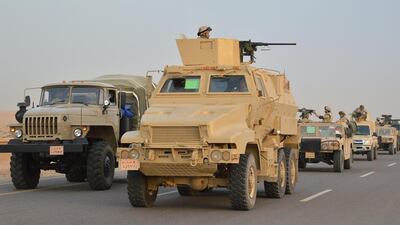Egypt went into full battle mode this weekend with the launch of “Operation Sinai 2018” — a massive security operation drawing on all wings of the armed services and the police force.
The comprehensive deployment is aimed at terror cells and criminal organisations not only in the restive peninsula but also in the Nile Valley and the Western Desert.
Armed forces spokesman Tamer El Refai issued the military's third communique on the operation Saturday afternoon with air, ground and naval units said to be targeting ISIL weapons and ammunition stores in the Sinai.
“Law enforcement, supported by special forces, border guards as well as police have carried out several simultaneous raids on towns in Central and Northern Sinai to chase runaway elements, eradicate them, and continue to demolish targets belonging to terrorists,” said Colonel El Refai.
President Abdel Fattah El Sisi pledged in November to wipe out terror elements “within three months” after militants killed more than 300 people at a mosque in the village of Al Rawdah, in the troubled northern sector of the peninsula near Bir El Abd town.
Security officials said forces killed at least 20 militants in Bir El Abd on Saturday and blocked off the highway linking El Arish, the main town in northern Sinai, with Sheikh Zuweid and Rafah to the east.
Meanwhile, the navy increased patrols on the seafront from Rafah to El Arish to cut off terrorist supply lines and guard economic installations in the area, the armed forces spokesman said.
“I follow with pride the heroics of my sons from the armed forces and the police to purge the beloved land of Egypt from terrorists, the enemies of life,” Mr El Sisi declared on Friday as the operation was launched. The interior ministry at the same time raised the national state of alert to the maximum level.
Indicators that the nation was on a war footing emerged on Thursday as the health ministry ordered hospitals in the Suez Canal zone to double the number of doctors per shift in emergency wards and ensure the availability of all blood types for transfusion.
Before an internet blackout in North Sinai on Friday, residents of Bir El Abd and El Arish reported that authorities were blocking private vehicles from entering the Ahmed Hamdi tunnel under the Suez Canal.
School closures and multiple checkpoints reflect the challenge security forces face in securing an area infiltrated by ISIL. Success, the government hopes, would enthuse voters for the presidential election on March 26-28.
On Wednesday the National Elections Authority announced it was printing more than 60 million ballot papers — a signal of the government's determination to more than double voter turnout from the 24.5 million who participated in the 2014 election.
But Mr Sisi’s self-described "brute force" approach to stamping out militancy risks alienating civilians caught in the crossfire, critics say.
"Since 2013, the military policy of collective punishment and not caring one bit about the collateral damage caused in operations reached no success whatsoever," said Mohannad Sabry, an independent journalist and author of Sinai: Egypt's Linchpin, Gaza's Lifeline, Israel's Nightmare.
“Hundreds of civilians have been killed by military fire, including men, women, children and even infants, close to a dozen villages have been partially or fully destroyed by the military and hundreds of thousands of productive trees, farms owned by the locals have been destroyed,” Mr Sabry said.
Analysts with closer ties to the security establishment dismissed claims that the intensified war against ISIL was a response to western media reports that the Israeli air force has been bombing terror targets in the Sinai on behalf of Egypt’s military.
“Political commentators in Egypt and abroad have tried and continue to try to mar Egypt’s record of success by disseminating rumours,” said Said Okasha, a regional security expert at the Al Ahram Centre for Political and Strategic Studies.
“Rumours circulated by political and media figures in Israel and the US to the effect that Egypt had agreed to land swap projects [for the Palestinians] or that Cairo had given Israel permission to conduct military strikes against terrorist groups in Sinai are short on professionalism and shorter on accurate information.”
_______________
Read more:
UN experts: ISIL militants still pose world threat
Pence promises Egypt full US backing in fight against militants
Egypt's Sisi to run for second term in March election
_______________

